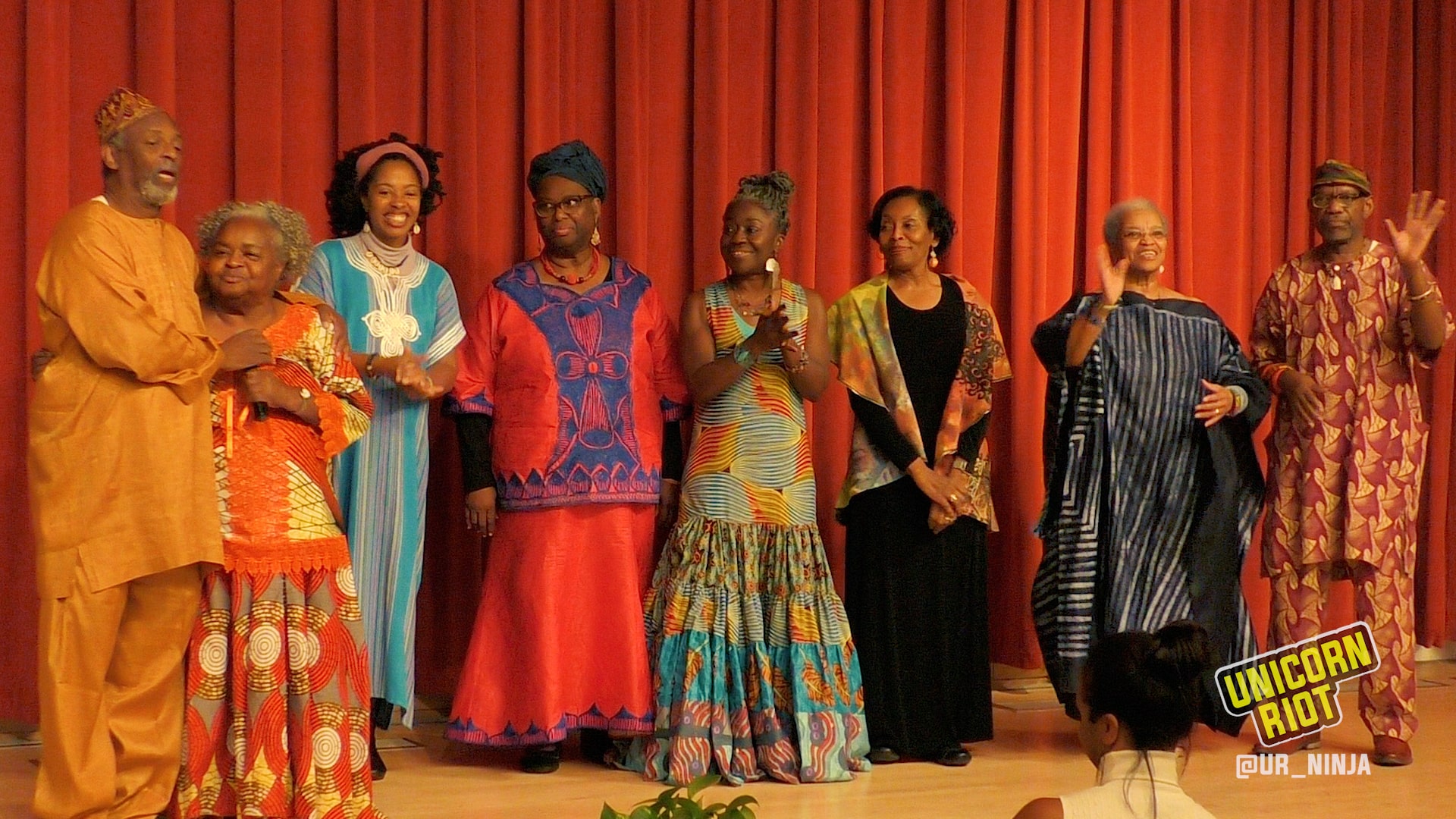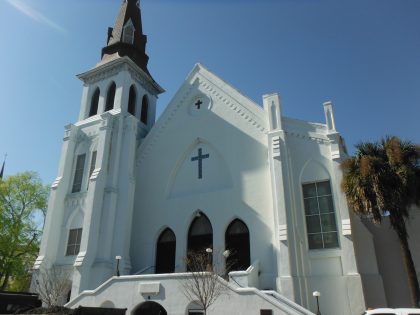Sharing Black History One Story at a Time: Festival Reaches 27 Years
Minneapolis, MN – The Black Storytellers Alliance (BSA) finished its 27th year of showcasing Black master storytellers from around the United States with a weekend of free events for the “Signifyin’ & Testifyin’” festival in late 2018. The theme of the 27th year was “And How Are The Children?”.
Vusumuzi Zulu, the director of the Black Master Storytelling Festival, told Unicorn Riot that storytelling is “one of the most powerful ways to transmit culture,” history, and traditions.
Unicorn Riot livestreamed the grand finale event of the three day festival and spoke with the festival director and five master storytellers (videos further below).
The Black Storytellers Alliance provides an outlet for master storytellers to preserve the stories of traditions, culture, heritage, and history through oral storytelling. This is especially important in Minnesota, whose white population peaks around 81%, and access to forms of non-European art is limited.
To organize the first of the 27 festivals, Vusi said that they took “out a little bit of a house mortgage…to make sure that we could bring folks in.” Vusumuzi (Vusi) and his wife Nothando, who created and run BSA, have dedicated a large portion of their life to giving back to the community through arts, education, and “edutainment,” as Vusi says.
See our past coverage: Black Storytellers Alliance Celebrates its 25th Annual Black Master Storytelling Festival [More coverage below]
The moment Vusi learned about his past, he said he was “charged with doing something.” He quoted Malcolm X (el-hajj Malik el-Shabazz) in saying that he is an African born in America and pointed out that some of his dedication to giving back to the community was sparked from the teachings of historian and lecturer Mahmoud El-Kati, who furthered his understanding of his African origins.
For running these festivals there is only enough for the master storytellers to receive just a “small stipend” for their three days of performances and workshops. The storytellers’ and the Zulu’s commitment to passing on their history, empowering Black youth, and motivating youth to read in their communities was seen during this festival.
“In this festival, we do specialize in African and African American folk tales. So it introduces all children to the African and African American culture,” said storyteller Toni Simmons. The storytellers Unicorn Riot spoke with reinforced the importance of having spaces where Black storytelling is available to the community, as storyteller Mother Minter said, allowing stories to be “passed down from generation to generation.”
The performing artists and master storytellers of the grand finale were: Voice of Culture Drum + Dance, LÄCA Bridges, Auntie Beverly Cottman, Oba William King, Mama Koku, Mother Minter, Toni Simmons, and Nothando Zulu. Watch the full livestream of the “Grand Finale Storytelling Concerts” and the interviews below.
“We’ve just got to get those stories told we’ve got to get children to see themselves as being people who have power, ability, and capability.” – Vusumuzi Zulu, “Signifyin’ & Testifyin'” Festival Director
“My goal with storytelling is to motivate children to read so when they hear this story orally, oh they want to go and find a book where that story is that they can read it.” – Toni Simmons, Storyteller, Author, Librarian
“If you think that you don’t have a strong background or base to grow up in you feel like there’s something missing in your life. So when our children are told about the history and that they do come from kings and queens…you need to know where you came from.” – Mother Minter, Storyteller, Author, Librarian
“Finding a likeness or connection and being able to see yourself in somebody else’s story. And I think when children are able to see themselves in stories that are created for them, created from their ancestors, it just can touch them a little bit more, you know. The more you have in common the more you can connect.” – Mama Koku, Storyteller, Author
“Keep it alive, make sure you support local storytellers because they’re out there, for schools, for churches, for communities, they’re out there and we all have something to learn and we all have a story to tell.” – LÄCA Bridges, Storyteller, Teacher
“Sometimes children have their first chance to experience the rhythm of the drums, African dance, and stories told in the African tradition so it’s important that we keep it alive.” – Oba William King, Storyteller, Founder of JustUs Arts
Unicorn Riot Coverage of the Black Storytellers Festival in Minneapolis
For more than three decades, the Black Storytellers Alliance has celebrated the art of storytelling through festivals in and around the Twin Cities. Held over three nights with free admission, the festival’s aim is to expose folks in the Minneapolis/St. Paul area to the power of Black storytelling by featuring master storytellers from around the country. Beginning in 2016, Unicorn Riot has covered and live streamed from the festival several times. In 2018, we heard from six of the master Black storytellers including festival director Vusumuzi Zulu, who said that storytelling is “one of the most powerful ways to transmit culture.“ View our coverage below.
Black Storytellers Festival Continues with Heavy Hearts as Matriarch Passes – 2023
Celebrating Black Joy Virtually as Black Storytellers Festival Hits 31 Years – 2021
28 Years of Black Storytelling – 2019
Sharing Black History One Story at a Time: Festival Reaches 27 Years – 2018 [YouTube Playlist]
Black Storytellers Alliance Celebrates its 25th Annual Black Master Storytelling Festival – 2016
Follow us on X (aka Twitter), Facebook, YouTube, Vimeo, Instagram, Mastodon, Threads, BlueSky and Patreon.
Please consider a tax-deductible donation to help sustain our horizontally-organized, non-profit media organization:



